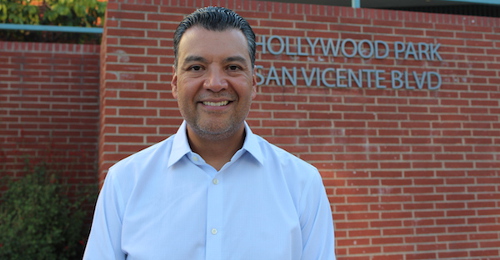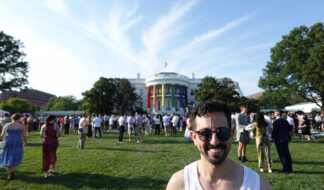BY KAREN OCAMB, LOS ANGELES BLADE

Alex Padilla is the Secretary of State for California. Photo by Karen Ocamb
California Secretary of State Alex Padilla was among the first secretaries of state in the country to refuse to comply with the Trump administration's demand to turn over voter data to the Presidential Advisory Commission on Election Integrity. The commission, headed by Vice President Mike Pence and Kansas Sec. of State Kris Kobach, was created by President Trump after he narrowly won the Electoral College but lost the popular vote to former Sec. of State Hillary Clinton because, he claims, "between 3 million and 5 million" votes were cast illegally–an assertion for which Trump provided no evidence and which has been repeatedly discredited.
In a June 28 letter sent to the nation's secretaries of states, Kobach asked for voter roll data, "including, if publicly available under the laws of your state, the full first and last names of all registrants, middle names or initials if available, addresses, dates of birth, political party (if recorded in your state), last four digits of social security number if available, voter history (elections voted in) from 2006 onward, active/inactive status, cancelled status, information regarding any felony convictions, information regarding voter registration in another state, information regarding military status, and overseas citizen information."
So far, 45 states and the District of Columbia say they are unwilling or unable to provide all the information requested by the Voter Fraud commission.
But even the release of publicly available information could be disastrous and terrifying for LGBT voters. Would name-change requests by transgender voters be considered voter fraud by biased, over-eager commission staffers? Would uncorrected dishonorable discharges under the gay military ban and Don't Ask, Don't Tell result in an LGBT voter being deemed unworthy to vote and be scrubbed from the rolls? Anti-gay sodomy laws were overturned in Texas and 14 other states under Lawrence v. Texas in 2003, but some states still have anti-sodomy laws on the books. Additionally, now-archaic anti-gay laws were often handled by biased prosecutors as felonious sex offenses that landed the accused on the sex offender registry, a lifelong stain.
In many states, a person convicted of a felony is prohibited from voting.
Even California has some cleaning up to do: being HIV positive and having unprotected sex without telling your partner your status is still a felony in California, despite taking medications and having an undetectable viral load. And there are still gay men on the sex offender registry convicted of felonies when homosexuality was a crime. Two bills to correct these issues by out state Sen. Scott Wiener and Equality California passed the Senate and are making their way through the Assembly.
One of the reasons cited by Padilla as part of his principled stance against the commission's request is the susceptibility of the massive data collection to hackers, not just Russian or Chinese but scam artists and blackmailers, the fear of which could result in suppression LGBT voters from registering and turning out to vote.
In response to a recent Trump tweet complaining about states balking–"What are they trying to hide?"–Padilla was forceful.
"I'm not trying to hide – I'm trying to protect," Padilla, the co-chair of the national secretaries of state' elections committee, which is meeting in Indianapolis on Thursday, told POLITICO on Wednesday. 'I'm trying to protect people's privacy and their personal information, and the integrity of the election," he said, calling the request "a hacker's dream come true."
"One of the main points of why we're safe now is because the elections are very decentralized. Right now, there is no nationalized centralized voter registration database," Padilla told Politico. The administration's request makes clear that what it is proposing is "not a secure site … and their plan was to make all the information publicly available."
"So at a minimum, it's a gift to anyone who wants to wreak havoc on the elections," Padilla said. "If you want to do Vladimir Putin a favor, put it all in one location."
In addition to his 'Just Say No' posture toward the Trump administration's voter suppression efforts, Padilla has been touting his plans to enhance voter participation, especially approaching the incredibly important 2018 mid-term elections. But, the Los Angeles Blade asked Padilla at a recent Stonewall Democratic Club meeting in West Hollywood, how could any voter trust the voting process these days, with both left and right claiming the "system is rigged?"
"I'm hopeful and optimistic," Padilla told the Blade. "If you recall, it was as early as last year, August, when Donald Trump started stoking the fears of the potential for the election to be rigged. And we didn't know who he was referring to–he probably had inside information.
"But we had record turnout in California, record voter registration and record turnout so that attempt didn't work," Padilla said. "But as time goes on, as he continues and others continue to allege that there's voter fraud, massive voter fraud, millions of illegal votes, my big concern is two fold: that it gets into people minds that maybe it won't matter so why should I turn out the next time. That's voter suppression 101. Number two–that in future elections, they're creating an environment for elections for both Congress and the president where they can roll back the clock on voters rights, as I see it–change the law, change policies, change how we conduct elections that has the net effects of making it more difficult for people who are eligible to register and to vote. And that, frankly, is just un-American, un-democratic."










